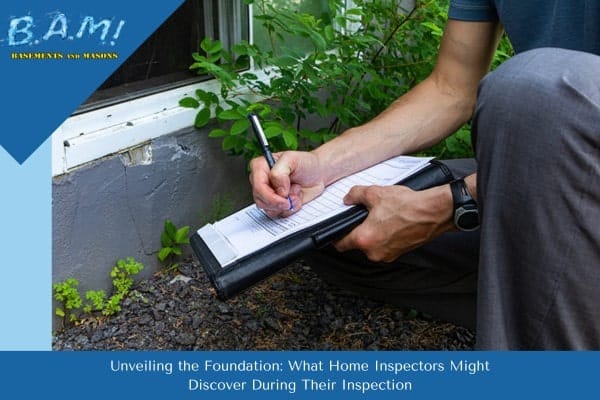The foundation of your home is the backbone of the structure. It provides the necessary support and stability, ensuring the home stands strong and secure. Any issues with the foundation can have serious consequences, leading to structural damage and compromised safety. When it comes to ensuring the integrity of your home’s foundation, inspections play a crucial role. Let’s take a look at what inspectors may see when assessing the foundation of a property, and why these inspections are essential for every homeowner.
Cracks and Settling:
One of the first things inspectors will look for during a foundation inspection are visible cracks on the walls, floors, and around windows and doors. Cracks can be a telltale sign of foundation problems, indicating that the home has settled or shifted over time. The size, shape, and location of these cracks can give valuable insights into the severity and nature of the foundation issues.
Uneven Floors:
Inspectors may also observe if the floors in the building are level and even. If they find sloping or uneven floors, it could be indicative of foundation settlement or sagging, which may require immediate attention to prevent further damage.
Water Damage and Drainage Issues:
Water is one of the most common culprits behind foundation problems. Inspectors will closely examine the property’s drainage system, looking for signs of poor water flow, improper grading, or water accumulation around the foundation. Prolonged exposure to water can cause the soil to expand and contract, putting immense pressure on the foundation walls and leading to cracks and structural weaknesses.
Sagging or Bowed Walls:
Inspectors will inspect the foundation walls for any signs of sagging, bowing, or inward movement. These issues may indicate pressure from soil or hydrostatic pressure against the foundation walls.
Pest Infestations:
Inspectors may also discover signs of pest infestations, such as termites or carpenter ants, during a foundation inspection. These pests can cause extensive damage to the wood components of a building’s foundation, compromising its stability and structural integrity.
Foundation Type and Materials:
Inspectors will identify the type of foundation used in the home, whether it’s a slab, crawl space, or basement. Different types of foundations have distinct vulnerabilities, which will be taken into consideration during the inspection. Additionally, the quality of the materials used in the foundation’s construction will be assessed.
Crumbling or Deteriorating Concrete:
If the foundation is made of concrete, inspectors will look for signs of deterioration or crumbling, which may indicate poor construction or aging.
Improper Repairs:
Previous repairs to the foundation may raise concerns if they were not done correctly. Inspectors will check for signs of improper or inadequate repairs that might need to be addressed.
Insufficient Ventilation:
In homes with crawl spaces or basements, inspectors will check for proper ventilation. Inadequate ventilation can lead to excess moisture buildup, fostering the growth of mold and mildew, which can further weaken the foundation.
Concrete and Reinforcement Quality:
For concrete foundations, inspectors will evaluate the quality of the concrete and check if proper reinforcement measures are in place. Poorly mixed or low-quality concrete and inadequate reinforcement can significantly affect a foundation’s strength and resistance to external forces.
Compliance with Building Codes:
Home inspectors may check whether the foundation meets current building code standards. If it does not, potential buyers might be hesitant about the property’s overall safety and compliance.
A thorough foundation inspection is essential for the safety and longevity of any home. By identifying potential issues early on, homeowners can address foundation problems before they get worse, saving themselves from costly repairs and preserving the value of their property. If you suspect any foundation issues or haven’t had your foundation inspected for a long time, it’s crucial to consult a foundation Repair Specialist or a professional inspector to assess the situation accurately and provide appropriate recommendations. Remember, a strong foundation is the key to a sturdy and secure home!
Foundation Issues can lower home value
If you can’t get repairs done due to budget constraints or other issues, it’s important to know that there will be consequences. The most notable is having to lower your asking price because the home value will decrease when foundation leaks are left unattended. These leaks will also need to be disclosed to any potential buyers so they know what they are truly getting and may impact the number of offers you get depending on the potential buyer’s understanding of the issue and what it might take to fix it themselves.
Foundations are easy to forget about when they are doing their job, which is why leaks and other issues can go unnoticed until an inspector comes in to check it out thoroughly. When you’re faced with foundation repairs, call the team you can trust at BAM Basements and Masons, to get you back on track and back on the market as quickly as possible. Bam basements is the highest award-winning foundation repair company in Central Iowa! The community has chosen us for best of Des Moines Cityview for the past 2 years, People’s choice awards and Ankeny community votes. When your home needs foundation work, call the best in Central Iowa. We have been around for over 11 years and continue to grow. Trust BAM with your home and get an honest upfront, no pressure estimates and the right solution for your home.


